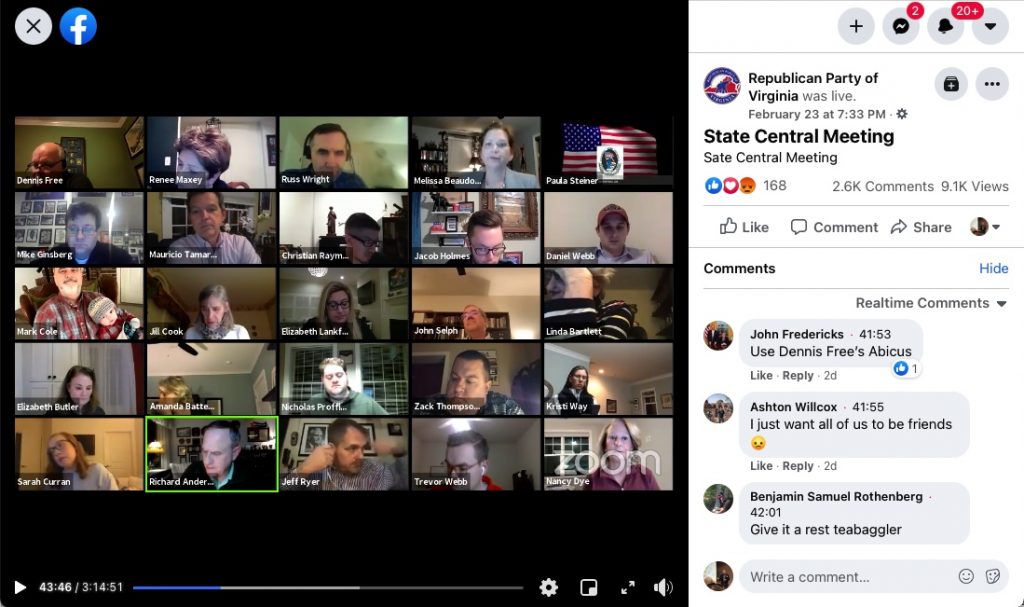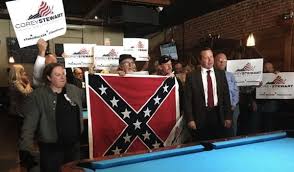I just read this post at Bearing Drift and posted a comment. The author, Brian Shoeneman, is a Virginia GOP activist who has run for local office on old-school conservative policies. He comes across to me as an establishment conservative who reveres the past and finds himself annoyed that Donald Trump, Tea Party activists, and other extremists have hijacked his Republican Party. In the old joke about how many Virginians it takes to change a light bulb, Brian Shoeneman is the one holding the ladder and waxing eloquently about how great the old light bulb was.
Here Shoeneman complains that elections come down to popularity contests, and rational voters, who “make decisions based on things like policy, ideology, and electability” don’t exist. As examples he uses Trump of course, but also Bill Clinton and Barack Obama. To be sure, he has named three popular politicians (though I would say that Trump appeals to a much more limited constituency), but he says nothing about the reason why people like them so much. Charisma matters, but I point out in my comment that policy matters as well.
Since the comment is rather long and makes what I think is an important point about why some Americans seem to like Donald Trump so much I thought I would repost my comment here:
This is an interesting, but in my view rather superficial, take on the election campaigns so far. A couple of thoughts.
First, let me challenge your assertion that voters don’t “make decisions based on things like policy, ideology, and electability.” For starters, the chief hermeneutic voters use to select a candidate is party identification. Those without the free time to spend conducting detailed research start by assuming that Republicans and Democrats differ in certain fundamental ways. This is why the core attack made on Trump is that he’s not really a Republican, and he’s not a “conservative.” His opponents try to tell voters not to apply this hermeneutic to Donald Trump. So yes, ideology makes a lot of difference.
I would also respectfully suggest that your Clinton and Obama examples do not support your claim. Bill Clinton won the Presidency on some very specific policy proposals – raise taxes on the wealthy to fix the budget and health care system, energy conservation and environmental protection to name two – against a very popular incumbent President. Barack Obama also ran on a specific policy platform that included higher taxes on the wealthy to pay for economic stimulus and ensuring better access to health care and ending needless war in the Middle East, among other ideas. To the extent these elections were “popularity contests” it’s because the policies these candidates proposed made them…popular.
Donald Trump is popular for another reason: he has tapped into residual white (especially male) anger at changes in American society that threaten their power. He appeals to the Warmac9999s of the world by suggesting that American is no longer great because we’ve let in too many brown people and given to much voice to women. These people are pissed because they can no longer express racist, bigoted, and sexist opinions without someone calling them out. This explains the emphasis on “political correctness” and the fact that evangelicals support Trump – note that a key reason his supporters like him is that he “speaks the truth.”
Conservatives have spent the last 45 years demonizing government and any effort to create an egalitarian society. They did this mostly in the service of corporations by enlisting religious leaders and disaffected white men using dog-whistle messages (e.g., “welfare queens”). As wealth inequality has grown, women assert themselves more, and the country becomes demographically more diverse these disaffected white men seek a hero. Donald Trump is popular with this constituency not because he’s famous. He’s popular with them because the believe he agrees with them that Mexicans cause their economic woes, Muslims cause their security fears, and no one can say the truth about this because “political correctness.” Warmac9999 and his ilk like Trump because they think he’ll “make American great again” by giving them the specific policies they want: a wall to keep Mexicans out, deportation of Muslims, and government support for rhetoric that accepts racist and sexist attacks on people they don’t like. He’s not popular because he’s famous and on television a lot. He’s popular because he gives angry white Americans license to express their racism and bigotry openly.


